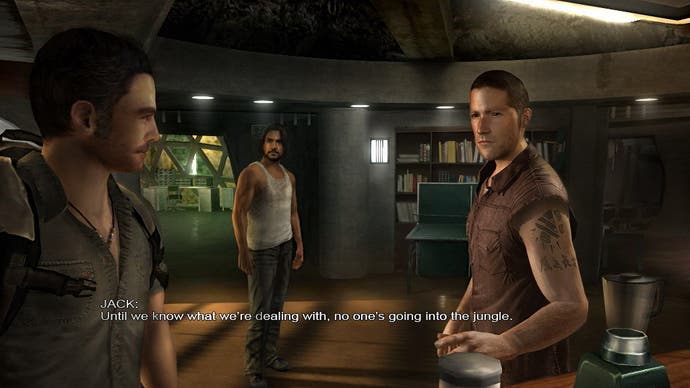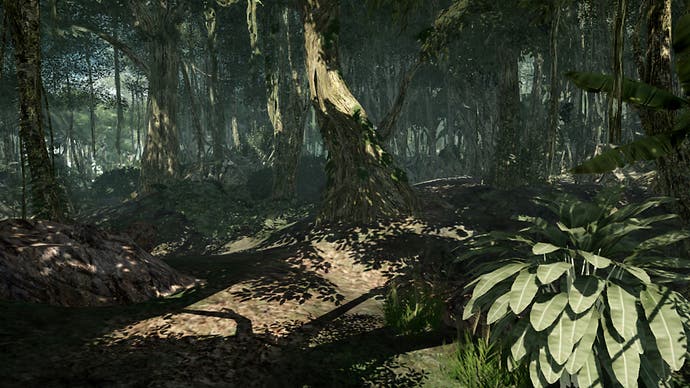Lost: The Video Game
It only took the bears two hours.
Among the more frequent challenges are electrical rewiring mini-games, which involve slotting and rotating three types of fuse into specific points on a network of circuits, the idea being to pump enough electricity into the dials at the end of each circuit that the voltage needle sits in the green zone - something that involves (gasp) a bit of maths as well as logic. The first and last of these are unexpected and complex respectively, while the others are quite straightforward, although satisfying enough. Less frequent but more powerful are the cave sections, where you have to use torches and lanterns to light your way and avoid plummeting into deep dark holes. It's here that the game borrows best from the TV show, conveying tension and peril very effectively through its use of music, pad vibration and subtle sound effects.
In order to get through them, and to survive some of the more rigorous challenges, you need to keep your eye out for food, water and other trinkets that can be traded with other survivors and, you know, others. Guns (very rarely fired), torches and additional fuses will be your main focus, and while the inventory - with a list of items, each with an associated dollar value - initially feels out of place, by the end of the game it's just part of the background.

You will notice by now that I'm trying to avoid linking these things to specific events. Obviously I don't want to spoil the story; it's what Lost does best, and it's what compels you through to the end of Lost: The Video Game. There are decent gameplay ideas, like chase sequences that involve vaulting logs and racing across narrow beams while being pursued, but on the whole the game is reliant on the sense of intrigue - not just in the story as it unfolds, but in being able to explore the Dharma Initiative's various stations, answering a few long-forgotten questions from the TV show's blink-and-you'll-miss-it past in the process - in order to maintain your interest. Puzzles are too straightforward, controls are a touch clunky, death - if you do succumb to it - kicks you back to the wrong side of unskippable cut-scenes, and nothing you do with your thumbs is complicated or especially taxing. There's very little hidden depth to the mechanics, which seems to fly in the face of the show somewhat, until you remember that you're not the only person who likes it; non-gamers do too.
It's for them, presumably, that the game has been made so short. The seven episodes are over in less than five hours, even if you take your time, and pretty much the only source of replay value is to go back and try and grab the rest of the memory items from flashback sequences, or snap photographs for each location - and this is probably only something you will need to do in one or two cases, since you quickly wise up to what the game wants by the time you've made it to episode three. Xbox 360 owners will see the end coming rather sharply thanks to the amazingly generous flow of gamerpoints - over 850 for all but the most cack-handed or inobservant first-timer - and it's thanks to the short run-time that Lost gets away with not developing its mechanics, where a longer game would depreciate more for their simplicity and repetition. A strictly single-player game, once it's over it goes back in the box.

At which point you're left to ponder whether it was any good. I'd go with "yes", actually. It had the incredibly difficult job of creating a new character in the Lost world with an interesting enough side-story, able to exist without disrupting the timeline or feeling like an aberration, and able to expose fans to at least a handful of things with which they would be satisfied, even eager, to tinker. There's no question it achieves that, and that's what Lost fans will want. Even at its worst - a particular trek through the jungle to the Black Rock and its repeated abuse of one of the show's most perplexing elements springs to mind - it's never guilty of ruining the source material, and while the big question it leaves you with is akin to some of the TV show's goofier cliffhangers, it's still intriguing. I love Lost - it's stupid, brilliant, baffling, frustrating - and I'm really glad I played this. I think other Lost fans will be too. But we will all sit back afterwards and moan about the length, and so that's the thought I'll leave you on. Booouuum.








